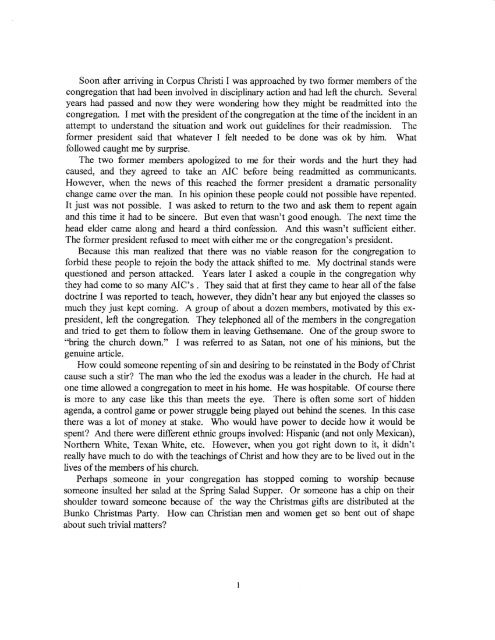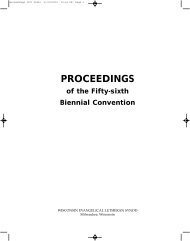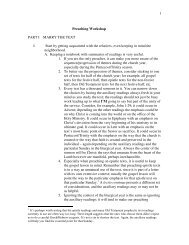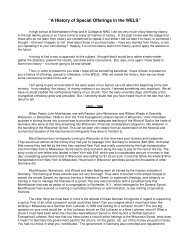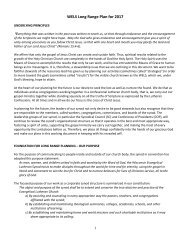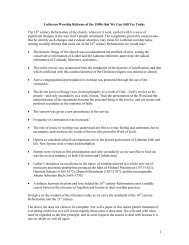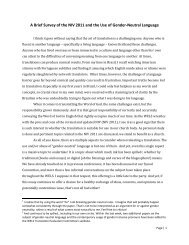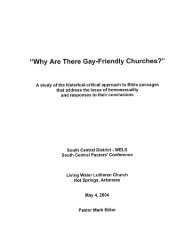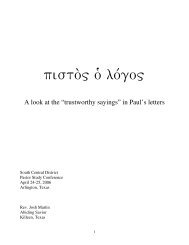Isagogical Study of Jude and Philemon
Isagogical Study of Jude and Philemon
Isagogical Study of Jude and Philemon
Create successful ePaper yourself
Turn your PDF publications into a flip-book with our unique Google optimized e-Paper software.
Soon after arriving in Corpus Christi I was approached by two former members <strong>of</strong> thecongregation that had been involved in disciplinary action <strong>and</strong> had left the church. Severalyears had passed <strong>and</strong> now they were wondering how they might be readmitted into thecongregation. I met with the president <strong>of</strong> the congregation at the time <strong>of</strong> the incident in anattempt to underst<strong>and</strong> the situation <strong>and</strong> work out guidelines for their readmission. Theformer president said that whatever I felt needed to be done was ok by him. Whatfollowed caught me by surprise.The two former members apologned to me for their words <strong>and</strong> the hurt they hadcaused, <strong>and</strong> they agreed to take an AIC before being readmitted as communicants.However, when the news <strong>of</strong> this reached the former president a dramatic personalitychange came over the man. In his opinion these people could not possible have repented.It just was not possible. I was asked to return to the two <strong>and</strong> ask them to repent agarn<strong>and</strong> this time it had to be sincere. But even that wasn't good enough. The next time thehead elder came along <strong>and</strong> heard a third confession. And this wasn't sufficient either.The former president refused to meet with either me or the congregation's president.Because this man realued that there was no viable reason for the congregation t<strong>of</strong>orbid these people to rejoin the body the attack shifted to me. My doctrinal st<strong>and</strong>s werequestioned <strong>and</strong> person attacked. Years later I asked a couple in the congregation whythey had come to so many AIC's . They said that at first they came to hear all <strong>of</strong> the falsedoctrine I was reported to teach, however, they didn't hear any but enjoyed the classes somuch they just kept coming. A group <strong>of</strong> about a dozen members, motivated by this expresident,left the congregation. They telephoned all <strong>of</strong> the members in the congregation<strong>and</strong> tried to get them to follow them in leaving Gethsenune. One <strong>of</strong> the group swore to"btittg the church down." I was referred to as Satan, not one <strong>of</strong> his minions, but thegenuine article.How could someone repenting <strong>of</strong> sin <strong>and</strong> desiring to be reinstated in the Body <strong>of</strong> Christcause such a stir? The man who the led the exodus was a leader in the church. He had atone time allowed a congregation to meet in his home. He was hospitable. Of course thereis more to any case like this than meets the eye. There is <strong>of</strong>ten some sort <strong>of</strong> hiddenagenda, a control game or power struggle being played out behind the scenes. In this casethere was a lot <strong>of</strong> money at stake. Who would have power to decide how it would bespent? And there were different ethnic groups involved: Hispanic (<strong>and</strong> not only Mexican),Northern White, Texan White, etc. However, when you got right down to it, it didn'treally have much to do with the teachings <strong>of</strong> Christ <strong>and</strong> how they are to be lived out in thelives <strong>of</strong> the members <strong>of</strong> his church.Perhaps . someone in your congregation has stopped coming to worship becausesomeone insulted her salad at the Spring Salad Supper. Or someone has a chip on theirshoulder toward someone because <strong>of</strong> the way the Christmas gifts are distributed at theBunko Christmas Party. How can Christian men <strong>and</strong> women get so bent out <strong>of</strong> shapeabout such trivial matters?
PHILEMONPaul most probably wrote this letter about 62 AD during his first imprisonment inRome. While waiting the outcome <strong>of</strong> the trial he enjoyed the limited liberties <strong>of</strong> animprisoned Roman citizen. He was allowed to live in a rented home. He was permittedvisitors <strong>and</strong> was allowed to preach under certain restrictions.. With him were his fellowmissionaries - Demas, Mark, Aristarchus, Luke, <strong>and</strong> Timothy. Messengers from Galatia,Philippi, Colossae <strong>and</strong> Ephesus had visited Paul <strong>and</strong> kept him informed <strong>of</strong> thedevelopments in the churches he had founded. One duy, he came into contact with,Onesimus, a runaway slave from Colossae. His owner was a Christian named <strong>Philemon</strong>.The epistle is an appeal by Paul to Philemor! on behalf <strong>of</strong> his mnaway slave. <strong>Philemon</strong>was probably a convert through Paul's efforts, although the two men may not have knownone another personally. <strong>Philemon</strong> was a zealous Christian, Paul calls him a co-worker.He is described as being loving <strong>and</strong> hospitable. A congregation met in his house forworship. Apparently Onesimus had stolen from <strong>Philemon</strong> <strong>and</strong> run <strong>of</strong>f to Rome. Both<strong>Philemon</strong> <strong>and</strong> Onesimus are probably Phrygians. Phrrygian slaves were usually regardedwith contempt. Onesimus was a very cornmon name among slaves.It is remarkable that such a short letter has been preserved. It is a personal letter <strong>and</strong>not addressed to a chwch. There is nothing that concerns the common salvation. Yet, itis given by inspiration <strong>of</strong> God <strong>and</strong> is pr<strong>of</strong>itable for "instruction in righteousness."The LetterGreetinss <strong>and</strong> ThankssivineI Paul a prisoner <strong>of</strong> Christ Jesus, <strong>and</strong> Timothy our brother,To Phitemon our dear friend <strong>and</strong> fellow worker, 2 to Apphia our sistero toArchippus our fellow soldier <strong>and</strong> to the church that meets in your home:3 Grace to you <strong>and</strong> peace from God our Father <strong>and</strong> the Lord Jesus Christ.4 I always thank my God as I remember you in my prayers, 5 because I hear aboutyour faith in the Lord Jesus <strong>and</strong> your love for all the saints. 6 I pray that you maybe active in sharing your faith, so that you will have a full underst<strong>and</strong>ing <strong>of</strong> everygood thing we have in Christ. 7 Your love has given me great joy <strong>and</strong>encouragement, because you, brother, have refreshed the hearts <strong>of</strong> the saints.Paul chooses to not mention his apostolic authority in writing <strong>Philemon</strong>. His requeston behalf <strong>of</strong> Onesimus was not to be tainted with any hint <strong>of</strong> intimidation. Fear <strong>and</strong>intimidation are powerful motivating factors in our world but they are not to be used assuch in Christ's church. Paul chooses to emphasize rather where living out Christ's will inhis life has led him - to prison. I cannot imagine that Paul enjoyed the confines <strong>of</strong>imprisonment, but I can imagine that because <strong>of</strong> all that his Lord had given up for hinrL heaccepted this incarceration "for His sake" as a great honor. The fact that Paul mentions
his imprisonment in his introduction <strong>and</strong> again in verse 9 makes it an essential part <strong>of</strong> histactful appeal to <strong>Philemon</strong>.A request is forthcoming from one who is so deeply committed to the cause <strong>of</strong> Chistthat he has relinquished his very freedom for its sake. Paul is a prisoner, <strong>Philemon</strong> is free,free to respond to Paul's request itt atty number <strong>of</strong> ways. But to what degree is a Christianever really free in making such decisions? The question that <strong>Philemon</strong> will have to sortout will be - "Do I do what I please?" or "Do I do what is right?" And, as a Christiaru"Can there be a difference?"Paul calls him a "dea^r friend <strong>and</strong> fellow co-worker." As far as we can tell hefunctioned as a lay leader in the church. Apphia is most likely his wife <strong>and</strong> Archippus, hisson. In Col . 4:47 Paul seems to indicate that Archipus was actually the pastor in charge<strong>of</strong> the Colossian congregation during the absence <strong>of</strong> Epaphraso who was in Rome withPaul at the time the two letters (<strong>Philemon</strong> <strong>and</strong> Colossians) were writtenPaul greets <strong>Philemon</strong> <strong>and</strong> family members <strong>and</strong> the church that meets in <strong>Philemon</strong>'shome with his familiar "grace <strong>and</strong> peace." This is appropriate because all <strong>of</strong> these peoplewill undoubtedly be brought into the discussion as to what to do with Onesimus. God'sundeserved intervention gifts us with true spiritual peace. In this instance, Paul is nodoubt hopeful that this greeting will serve as a reminder <strong>of</strong> the forgiving love that God hasshowered on <strong>Philemon</strong>, which, in turn, will motivate him to do the same to the penitentOnesimus.Paul concludes his greeting with a short prayer. In it he thanks God that the HolySpirit has worked faith in <strong>Philemon</strong> <strong>and</strong> enabled him to give so numy practical evidences<strong>of</strong> this faith. Paul asks that he continue to share his faith through his words <strong>and</strong> lifestyle,so that he will continue to grow in his spiritual underst<strong>and</strong>ing <strong>of</strong> how faith in Christ affectsevery aspect <strong>of</strong> our lives. This growth would lead to ever greater evidences <strong>of</strong> God atwork in <strong>Philemon</strong>'s life. Hearing <strong>of</strong> <strong>Philemon</strong>'s Christian walk had been a joy <strong>and</strong>encouragement in the past. Now Paul hopes that his joy will be increased as this fellowbeliever is enabled <strong>and</strong> motivated by the Spirit to perform the special act <strong>of</strong> love which heis about to request <strong>of</strong> him.Paul's Request8 Therefore, although in Christ I could be bold <strong>and</strong> order you to do what you oughtto do, 9 yet I appeal to you on the basis <strong>of</strong> love. f then, as Paul- an old man <strong>and</strong>now also a prisoner <strong>of</strong> Christ Jesus - 10 I appeal to you for my son Onesimus, whobecame my son while I was in chains. 11 formerly he was useless to you, but now hehas become useful both to you <strong>and</strong> to me.12I am sending him - who is my very own heart - back to you. 13 I would haveliked to keep him with me so that he could take your place in helping me while I amin chains for the gospel. 14 But I did not want to do anything without your consent,so that any favor you do will be spontaneous <strong>and</strong> not forced. 15 Perhaps the reasonhe was separated from you for a little while was that you might have him back forgood - 16 no longer as a slave, but better than a slave, as a dear brother. He is verydear to me but even dearer to you, both as a man <strong>and</strong> as a brother in the Lord.
17 So if you consider me a partner, welcome him as you would welcome me. 18 If hehas done you any wrong or owes you anything, charge it to me. L9 I, Paul, amwriting this with my own h<strong>and</strong>. I will pay it back - not to mention that you owe meyour very self. 20 | do wish brother, that I may have some benefit from you in theLord; refresh my heart in Christ. 21 Confident <strong>of</strong> your obedience, I write to you,knowing that you will do even more than I aslcPaul gets right to the point. While <strong>Philemon</strong> loved <strong>and</strong> respected hirn, he doesn'twant any special favors because he is an apostle. No strong-arm tactics here. It is purelyon the basis <strong>of</strong> Christian love that he intercedes on Onesimus' behalf. He presents himselfas an old man who is in prison for his faith who is appealing to <strong>Philemon</strong> to show himChrist's love in action. As a Christian who previously showed love <strong>and</strong> hospitality toothers, he would find it difficult to refuse Paul's request to love somecjne.Assertiveness may open doors. But for the Christian love is still a more powerfulmotivating force than fear <strong>and</strong> intimidation. Love motivated Jesus to give himself up forus. Paul described the Christian life as a crawling up on an altar ffid, out <strong>of</strong> gratitude forall he has done for us, <strong>of</strong>feriog r'rp to God our lifeblood <strong>and</strong> energy as a living sacrifice(Ro. 12:1-3). Love is our motivating force <strong>and</strong> the dress by which we are recognized bya love-starved world as being in Christ.Paul, in his role as mediator, chooses his words carefully. He loves both <strong>of</strong> these men.<strong>Philemon</strong>'s response to Paul's request will speak eloquent volumes on or raise seriousquestions about the Christian faith. Much is at stake.Paul had already praised <strong>Philemon</strong>. Now he gets right to the heart <strong>of</strong> the delicatesituation on his heart as he presents Onesimus as "my son." More emotionally chargedstill, the one '\vho became my son while I was in chains." With a play on words heanimates the wonderful change that the Sprit has worked in Onesimus' heart <strong>and</strong> life. Achange, it might be added, that had been worked in Paul's life <strong>and</strong> <strong>Philemon</strong>'s. His namemeant 'lrseful" but he had proven himseH to be anything other than that (a thief <strong>and</strong> arunaway).I can well imagine that in anger <strong>Philemon</strong> had sworn that if he ever got a hold <strong>of</strong>Onesimus again he would teach him a lesson <strong>and</strong> punish him with the fulI force <strong>of</strong> the law.Now he hears that he has been converted by the famous apostle. Paul claims that he ishelping him <strong>and</strong> would like to make a new start with <strong>Philemon</strong>, if he will allow it. Paulfurther states that a deep bond has developed between them. "I am sending him - who ismy very heart - back to you."Paul is sending him back because he feels it is the Christian thing to do in this situation.And Onesimus is willing to do whatever it takes to make things right. Paul could havereasoned that harsh treatment awaited Onesimus <strong>and</strong>, therefore, have decided to keep himsafe <strong>and</strong> useful to him in Rome. He could have charged <strong>Philemon</strong> for his care as aprisoner <strong>of</strong> the gospel for <strong>Philemon</strong>'s sake with Onesimus serving as payment, after all itwas because <strong>of</strong> his efforts to save people like <strong>Philemon</strong> that Paul was in prison. But hedid neither, because it was not up to Paul to decide.It was up to <strong>Philemon</strong> to review God's grace <strong>and</strong> recount the blessings received in hislife. Paul was making a suggestion, but <strong>Philemon</strong> was the Christian steward who neededto respond in love. There was no Old Testament tithe rule or regulation that could
determine this New Testament case <strong>of</strong> casuistry. Paul had to send him back. Now, it wasup to <strong>Philemon</strong> to decide.Paul doesn't try to excuse the past behavior <strong>of</strong> Onesimus. He recommends only that<strong>Philemon</strong> should forgive him. As to the '\vhy?" he asks that <strong>Philemon</strong> consider the waysin which the Lord overruled Onesimus' past <strong>and</strong> worked things out for good.While things had gone bad between <strong>Philemon</strong> <strong>and</strong> his slave, Onesimus had become ablessing to Paul. Paul is suggesting that given another opportunity, Onesimus might turnout to be an asset to him as well. He had been out a slave, now he would have him back.And not begrudging, but willfully serving their Lord as he served his master. There wasnow a spiritual tie that connected them. This new bond didn't onty change things for thebetter on earth, but added an eternal aspect to their relationship.Paul knew <strong>Philemon</strong> would welcome hinL <strong>and</strong> asks now that he welcome Onesimus inthe same way. All three <strong>of</strong> them are now brothers in Christ. How cdna Christian fail tolovingly receive a brother who comes in repentance <strong>and</strong> seeks forgiveness? Well ithappens <strong>and</strong> more times than we care to admit.The financial loss to <strong>Philemon</strong> is certainty something that would have made forgivenessdifficult. Slaves cost money. Onesimus stole valuables. Time was money already 2,000years ago. Paul realizes this <strong>and</strong>, as his spiritual father, steps up <strong>and</strong> <strong>of</strong>fers to make good<strong>Philemon</strong>'s loss. We may find it dfficult to see how Paul could have raised a possiblylarge sum <strong>of</strong> money while in prison, but Paul was resolute <strong>and</strong> obviously good for hisword in making such an <strong>of</strong>fer.How much is salvation worth? Jesus said it was worth more than gaining the wholeworld. Paul is hinting at this when he says that <strong>Philemon</strong> "owed" Paul his 'Aery own self."In other words, "Whatever amount you ask, we're more than even!"Prison is not a fun place to be. "I wish for benefit . . . refresh my heart." <strong>Philemon</strong>was in a position to do something really wonderful for an aging apostle <strong>of</strong> Christ who hadbeen through the wringer on nuuly occassions. Love that reconciles God <strong>and</strong> sinnerscould now be evidenced in two very different men being brought together. One a slave,the other the master. One a thief <strong>and</strong> outlaw, the other the victim. A positive responsefrom <strong>Philemon</strong> would be a beautiful example <strong>of</strong> how it is all suppose to work. Christiansrefreshing one another when Christ's love is lived out toward one another.Clqse <strong>and</strong> Benediction22 One thing more: Prepare a guest room for me, because I hope to be restored toyou in answer to your prayers.23 Epaphras, my fellow prisoner in Christ Jesus, sends you greetings. 24 And so doMarb Aristarchus, Demas <strong>and</strong> Luke, Dy fellow workers.25 The grace <strong>of</strong> the Lord Jesus Christ be with your spirit.Paul 's request is in writing. Now it's up to <strong>Philemon</strong>. Paul does not know whatexactly will happen, but he knows the Lord will use it to the benefit <strong>of</strong> all involved. Paul'sconfidence is expressed in his simple request to have a room ready <strong>and</strong> waiting. Heexpects to be freed. <strong>Philemon</strong> was irmong those who were praying on his behalf. Plans
had been drafted that apparently included Colossae. Paul <strong>and</strong> his fellow-travelers willneed a host. Why not express yet another way that <strong>Philemon</strong> might add to Paul's joy, askhim to be their host.Five men join with Paul in sending their greeting. Among them is Epaphras,<strong>Philemon</strong>'s pastor in Colossae. Whatever <strong>Philemon</strong> decides in the matter is <strong>of</strong> interest tothem all. Would they see forgiving love modeled after Christ's example or . . . .SlaverryThe institution <strong>of</strong> slavery was recognized, though not established, by Mosaic Law. Atthe time, a labor or middle class as we know it was virtually unknown. A slave thenoccupied the same social positions as a servant or laborer today, but differed from him inregard to political status.<strong>Philemon</strong>, is the only book <strong>of</strong> the New Testament, that deals almost specifically withthis issue, <strong>and</strong> yet does not address the matter in the manner that nuuly Christiansthroughout the ages might like to have seen. Today, we are not confronted with the legalproblems <strong>of</strong> slavery, but the slavery-entwined issues that are thorny <strong>and</strong> difficult tountangle, those dealing with segregation <strong>and</strong> integration.While Onesimus was a slave in the Roman Empire, Paul was a Hebrew, <strong>and</strong> so theHebrew concept <strong>of</strong> slavery must be taken into account as well. Under Roman law amaster had the legal right to inflict severe punishment, even deattu on a runaway slave.Slavery as practiced by the Hebrews under the sanction <strong>of</strong> the Mosaic Law was veryhumane. A Hebrew slave could not be kept for more than 6 years. In some cases a slavewas better <strong>of</strong>f in a servile condition than if he were free. There were special rules for thecase <strong>of</strong> those who wanted to be slave "forever." The Talmud said that the master <strong>of</strong> aHebrew slave (male or female) "must place him on equality with himself in lodging, food,<strong>and</strong> must act toward him in a brotherly manner." Accorditrg to Lev. 25:45-46, Hebrewswere permitted to buy Gentile slaves, who became personal property <strong>and</strong> were inheritedby the owner's children. The owner's power over his slaves was limited by law. Ifperrrulnent bodily harm was caused while punishing a slave, the slave was to be set free. Ifthe master was the cause <strong>of</strong> death, then the master was to be treated as a murderer. Aslave who escaped <strong>and</strong> sought refuge in Israel was not to be returned to his master. Thereis no question here that Paul was guilty <strong>of</strong> going against this law in this case, since he wasnot living in Israel at the time <strong>and</strong> Onesimus returned voluntarily.In the letter, Paul does not comrn<strong>and</strong> or plead with <strong>Philemon</strong> to free Onesimus. Thepurpose <strong>of</strong> the gospel is not to change the social order, but to change human hearts. Paulknew that with the gospel in the hearts <strong>of</strong> masters <strong>and</strong> slaves Christian concern woulddevelop for one another <strong>and</strong> one <strong>of</strong> the results <strong>of</strong> this love would be the elimination <strong>of</strong> theabuses <strong>of</strong> slaverv.
IVhat Happened?Why is it that Christians who have experienced just how wonderful God's forgivenessis, so <strong>of</strong>ten have such a difficult time forgiving others as God would have us do?While there is not much controversy regarding the authorship <strong>of</strong> the letter, my firstimpression was that I found it difficult to see Paul as the writer. From my wonderfullydirective American perspective I saw his barrage <strong>of</strong> flattery that precedes his request bothuncharacteristic <strong>and</strong> unbecoming <strong>of</strong> the apostle. Where was my Paul who always getsright to the meat <strong>of</strong> the matter? "Who has bewitched you!" "Don't be deceived: Godcannot be mocked!" Words like these rally the hearts <strong>of</strong> church workers <strong>and</strong> lay leaderswho take a relentless beating from the world in which they live <strong>and</strong> at times from thesheep <strong>of</strong> their own flocks. It seems so unbecoming <strong>of</strong> Paul to be playing the mid-eastemflattery game with <strong>Philemon</strong>. Butter him up. Come at him with an indirect request. Makeexaggerated promises that can't be kept. People use such tactics in some cultures inmaking a request when they are doubtful as to how it would be received. A Christianneeds to forgive. Why not just come out <strong>and</strong> say it? I think a quick reference to Jesuswords on the Unjust Servant should have been enough. As a Phrygian, perhaps <strong>Philemon</strong>had his own personality shortcomings that Paul was taking into account.While developing his request Paul instructs. He reminds him why Christians do whatthey do. Ours is a faith bases on what Christ has done. We strive to do what we dobecause it is God's will. We <strong>of</strong>ten find ourselves in the position <strong>of</strong> giving up so that othersgain.Quickly deciding on an involved issue is not always possible nor advisable. Vocalizinga st<strong>and</strong> because others feel it is right, may causo difficulfy later on when it comes to livingwith a decision that as you think things over you feel was forced on you <strong>and</strong> you wouldhave, should have decided differently.We are not told what happened with Onesimus. He may have been tossed into prison.If Paul could be an effective missionary from his confinement, why not Onesimus.Perhaps he was readmitted into the household <strong>of</strong> <strong>Philemon</strong> with the underst<strong>and</strong>ing that hework extra hard at wiping out his thievery obligation. Perhaps the debt was forgiven <strong>and</strong>he was permitted to go on as a slave. Because slaves were entreated by Paul to workdiligently for their masters <strong>and</strong> masters were supposed to treat their slaves well, it is a littledfficult to imagine that Onesimus was set free. Perhaps he was. Perhaps it wassomething that happened later. We don't know. I can well imagine that if Christianmasters freed their Christian slaves there would have been rnass conversions in thesehouseholds. The silence that comes to us by way <strong>of</strong> tradition is perhaps an indication thatthe saga ended differently that Paul would have liked to have see& Let's not paint toowonderful an ending to this story because Paul was involved. People with sinful naturesget in the way <strong>of</strong> well-meaning clergy regularly. Things didn't always work outwonderfully because <strong>of</strong> his faith in Christ. Problems had no trouble finding him.Barnabus, his co'worker left him. Demas, mentioned in verse 25 later left the faith <strong>and</strong>deserted Paul (II Tim. 4:10). He had been driven out <strong>of</strong> numy towns. I don't imaginepeople protested <strong>and</strong> rioted against hirn, beat him <strong>and</strong> stoned him because they liked himso much. And now he was in prison because the government that he told people to respecthad turned hostile to the Lord he proclaimed. One Christian doesn't always agree with
what another Christian does, sometimes we can't underst<strong>and</strong> it at all. Paul was content inlooking to the Lord <strong>and</strong> not basing his sanity on the underst<strong>and</strong>ing what makes others tisk.It is fine to let your mind fantasize with what-ifs when we have no facts. However,the outcome, whatever, does not detract from the wonderful opportunity these verses giveus to reflect on our Savior's loving <strong>and</strong> ongoing intercession for us. Luther wrote (LW35:390 "What Christ has done for us with God the Father, that Saint Paul does also forOnesimus with <strong>Philemon</strong>. For Christ emptied himself <strong>of</strong> his rights (Phil. 2:7) <strong>and</strong>overcame the Father with love <strong>and</strong> humility, so that the Father has to put away his wrath<strong>and</strong> rights, <strong>and</strong> receive us into his favor for the sake <strong>of</strong> Christ, who so earnestly advocatesour cause <strong>and</strong> so heartily takes our place. For we are all his Onesimuses if we believe."JUDEThis short letter is the last <strong>of</strong> the general epistles, <strong>and</strong> undoubtedly one <strong>of</strong> the leastfamiliar books <strong>of</strong> the New Testament. It is very possible that most Christians have neverheard a sennon preached on it. Yet its timely warning against false teachers <strong>and</strong> itsencouragemento "fight for the faitH' are topics that are always in season.The epistle was written around 65 AD, <strong>and</strong> possible served as a catalyst for Peter'ssecond letter (or II Peter was the catalyst for <strong>Jude</strong>, which addresses the matter <strong>of</strong> falseteachers assaulting the churches in Asia Minor). In anutshell, the purpose <strong>of</strong> <strong>Jude</strong> was toencourage the church to effectively <strong>and</strong> immediately deal with false teachers.The letter is addressed to 'to those who have been called [to faith in Christ], who areloved by God the Father <strong>and</strong> kept by Jesus Christ." Possibly, like his brother's letter, theepistle was meant for the church at Iarge. If it was intended for a specific group, we donot know who the people were. However, given the numerous Old Testament references,they were, very probably, Jewish Christians.GreetineI <strong>Jude</strong>, a serrant <strong>of</strong> Jesus Christ <strong>and</strong> a brother <strong>of</strong> James,To those who have been called, who are loved by God the Father <strong>and</strong> kept by JesusChrist:2 Mercy, peace <strong>and</strong> love be yours in abundance.The author introduces himself as a "servant <strong>of</strong> Jesus Christ <strong>and</strong> a brother <strong>of</strong> James"(1).A servant because those who hold Jesus as Master find perfect freedom in a life <strong>of</strong> serviceto him. The James mentioned here is not the disciple James, but James 'the brother <strong>of</strong>Jesus"(Mk. 6:3 <strong>and</strong> Matt .13:55), who was the head <strong>of</strong> the church in Jerusalem. Duringhis ministry, Jesus brothers did not believe his claim to be the Messiah (John 7:5). Theiropinion was that he was "out <strong>of</strong> his mind" (Mark 3:21) <strong>and</strong> they interfered with hisministry (Matt. 12:46 <strong>and</strong> Jn. 7:3,4). On one occasion, Jesus expressed "Only in hishometown <strong>and</strong> in his own house is a prophet without honor" (Matt. 13:57). After the
esurection, we find Jesus' mother <strong>and</strong> brothers praying together with the disciples (ActsI : 14).<strong>Jude</strong> identifies Christians as those "those who have been called, who are loved by Godthe Father <strong>and</strong> are kept by Jesus Christ" (1).He is praying for certain qualities in his readers' lives. "Mercy, peace, <strong>and</strong> love . . . inabundance"(2). The inclusion <strong>of</strong> "mercy" is rare in a greeting (cf II Jn. 3, I Tim.7:2,,IITim. 1:2) but important because it is always occurs against a backdrop <strong>of</strong> false teaching.It is a reminder that Christians st<strong>and</strong> in constant need <strong>of</strong> God's mercy. Nothing butunmerited mercy can meet the constant needs <strong>of</strong> habitual sinners.Point <strong>of</strong> Writins3 Dear friends, although I was very eager to write to you about the salvation weshare, I felt I had to write <strong>and</strong> urge you to contend for the faith that was once for allentrusted to the saints. 4 For certain men whose condemnation was written aboutlong ago have secretly slipped in among you. They are godless men, who change thegrace <strong>of</strong> our God into license for immorality <strong>and</strong> deny Jesus Christ our onlySovereign <strong>and</strong> Lord.What <strong>Jude</strong> writes in this epistle is not what he would have liked to have penned"concerning the salvation we share" (3). Salvation to <strong>Jude</strong>, meant not only pastdeliverance (5), but present experience (23t.) <strong>and</strong> future enjoyment <strong>of</strong> the glory <strong>of</strong> God(25). A true pastor <strong>of</strong> God's sheep needs to be a watchman (Acts 20:28-30,F,2.3:17-19). Unfortunately, this part <strong>of</strong> his duty is <strong>of</strong>ten shortchanged or even totally neglected inour under-the-pressure-to-be-more-tolerant world. Here, <strong>Jude</strong>, as watchman, is soundingthe alarm. False teachers had slipped into the church. "Godless men, who change thegrace <strong>of</strong> our God into a lisense for immorality <strong>and</strong> deny Jesus Christ our only Sovereign<strong>and</strong> Lord"( ). They were undermining the gospel by attacking the Lordship <strong>of</strong> JesusChrist. In effect, they were denying the Holy Trinity, <strong>and</strong> therefore, belief in the true God.If Jesus was not God, thanhis workto save allmenwould not have been sufficient.These men had "secretly slipped in among you" (4). The Scriptures contain amplewarnings <strong>of</strong>the coming <strong>of</strong> false prophets. There will always be those withinthe sheepfoldwho have not passed through the door, but have climbed in some other way to menace thesheep. Their teachings ran contrary to 'the faith that was once for all entrusted to thesaints"(3). Apostolic teaching has always been normative for the people <strong>of</strong> God <strong>and</strong> notsome current theological fashion. The test <strong>of</strong> Christian "progress" is faithfulness to theapostolic teaching about Christ. "Contending for the faith," in a generalway, includes theongoing challenge to express the faith in terms that are comprehensible to contemporaryruul However, here, it goes beyond the general to the specific errors <strong>and</strong> false teachersthat needed to be dealt with.They were treating God's gracious acceptance <strong>of</strong> sinners as justification for ongoing,flagrant, shameless sin in their lives. This is an inherent risk in the proclamation <strong>of</strong> thegospel <strong>of</strong> free grace. The conclusion some draw is to stop preaching free grace. The NewTestament conclusion was to attack the sin <strong>and</strong> to continue to preach the grace <strong>of</strong> God
who accepts the unacceptable. (Paul had addressed a similar situation in Rome. Hisresponse: "What then? Shall we sin because we are not under law but under grace? Byno means!" Ro. 6:15)Denying Christ as Lord is an obvious element <strong>of</strong> all non-Christian religions. Satan isrelentless in his attempts to gradually infiltrate Christianity with 'lrnitarian" thinking.Equally as bad as those who outright deny Ctrist as the Second Person <strong>of</strong> the Trinity arethose who confess "Jesus is Lord!" but then deny it by their teachings <strong>and</strong> lifestyle. Thosewho deny the inerrancy <strong>and</strong> infallibility <strong>of</strong> Scripture undermine the Word through whichChrist exercises his Lordship. People deny his Lordship when they hold their ownopinions <strong>and</strong> experiences as being a greater authority than Scriptures. And the list goes on<strong>and</strong> on. We must never stop fighting to preserve the Word <strong>of</strong> truth in the form that Godhas committed to his ChurchSatan twists the good news <strong>of</strong> free forgiveness to try to get Christiirns to trivialize theirsin. Christians who refuse to repent <strong>of</strong> sinful thoughts, words, <strong>and</strong> deeds are toying withtheir salvation. The writer <strong>of</strong> Hebrews wrote, "If we deliberately keep on sinning afterwe have received the knowledge <strong>of</strong> the trutlu no sacrifice for sins is left, but only a fearfulexpectation <strong>of</strong>judgment <strong>and</strong> <strong>of</strong> raging fire that will consume the enemies <strong>of</strong> God"(Heb.10:26,27).Many pastors have had men or women in their <strong>of</strong>fice adamant about divorcing theirspouse while claiming that they know its wrong but they know deep down inside thatGod will forgive them later. I was somewhat shocked to hear that the group that had thehighest divorce rate in the U.S. was not the atheists but the Baptists. One num told methat God loves him <strong>and</strong> wants him to be happy. And that means that God couldn't wanthim living with his wife. I've heard similar lines <strong>of</strong> argumentation from people havingaffairs <strong>and</strong> those who feel that God created them gay. And there are the people who livetogether <strong>and</strong> still come to church. Always the droning mantra "Everyone is a sinner <strong>and</strong>God forgives our sins, so why stop?!!" These people change the grace <strong>of</strong> God into alicense for immorahfy.Christian love is not sentimental acquiescence to what others are doing , it springs fromconviction <strong>and</strong> dem<strong>and</strong>s that soul destroying issues be addressed with God's law. Thetruth is something we a.re to fight for. "Christians, wake up! Fight for the faith!"Three Wamings5 Though you already know all this, I want to remind you that the Lord deliveredhis people out <strong>of</strong> Erypt, but later destroyed those who did not believe. 6 And theangels who did not keep their positions <strong>of</strong> authority but ab<strong>and</strong>oned their own home- these he has kept in darkness, bound with everlasting chains for judgment on thegreat Day. 7 ln the same similar way, Sodom <strong>and</strong> Gomorrah <strong>and</strong> the surroundingtowns gave themselves up to sexual immorality <strong>and</strong> perversion. They serve as anexample <strong>of</strong> those who suffer the punishment <strong>of</strong> eterrral fire.<strong>Jude</strong> proceeds to state in no uncertain tenns what will befall such false teachers.There are severe <strong>and</strong> deadly consequences for unbelief, both in time <strong>and</strong> in eternity. Hel0
mentions three instances <strong>of</strong> divine judgment with which they had been familiar <strong>and</strong> hadnow, apparently, conveniently forgotten. Judgment, he reminds thenr, was meted out torebellious Israel, to the fallen angels, <strong>and</strong> to the decadent cities <strong>of</strong> the plain.The Lord had chosen Israel. He miraculously led them out <strong>of</strong> captivity <strong>and</strong> providedfor them. There was no limit to what he wouldn't do for them. They were to be animportant part in his plan to save the world. Yet, almost to a person, the adultsmurrnured, complained, rebelled <strong>and</strong> finally voiced their desire to be back in Egypt asslaves. As a result their bodies were scattered over the desert <strong>and</strong> only their children wereallowed to enter the promised l<strong>and</strong>.<strong>Jude</strong>'s second example is <strong>of</strong> the angels who rebelled against God (Is. 14: 12-15 <strong>and</strong> Ez.28:l- 19), <strong>and</strong> thus forfeited their place in heaveru ending up in permanent darkness. Theyare bound, awaiting the confirmation <strong>of</strong> their punishment on judgment day. In Revelationchapter t2, the number <strong>of</strong> these angels(demons) are described as one-third <strong>of</strong> the stars inthe sky, swept out <strong>of</strong> their places by the tail <strong>of</strong> the red dragorq "that ancient serpent, calledthe devil, or Satan, who leads the whole world astray''(9). And hell isn't pictured as anendless party for the fallen angels, but a lake <strong>of</strong> burning sulfir, aplace <strong>of</strong> endless torment,where they will exist forever in frustration, pain, ffid rage.The final example <strong>of</strong> God's swift <strong>and</strong> terrible judgment was directed at the cities <strong>of</strong>Sodom <strong>and</strong> Gomorrah (also, Admah <strong>and</strong> Zebonr) for their unnatural sin <strong>of</strong>homosexuality.God holds the impenitent sinner accountable. Rebellion is not tolerated. What <strong>Jude</strong>implies is clear, just as God had acted as Judge in each <strong>of</strong> these three Old Testamentincidents, so he will also judge these false teachers (atrd those <strong>of</strong> any future age).8 In the very same way, these dreamers pollute their own bodies, reject authority<strong>and</strong> sl<strong>and</strong>er celestial beings. 9 But eyen the archangel Michael, when he wasdisputing with the devil about the body <strong>of</strong> Moses, did not dare bring a sl<strong>and</strong>erousaccusation against himo but said, "The Lord rebuke you!" l0 Yet these men speakabusively against whatever they do not undenst<strong>and</strong>; <strong>and</strong> what things they dounderst<strong>and</strong> by instinct, like unreasoning animals - these are the very things thatdestroy them.<strong>Jude</strong> wants his readers to underst<strong>and</strong> just how deadly these two teachings are (denyingthe deity <strong>of</strong> Christ <strong>and</strong> changing the gospel into a license to sin). These teachers mayappear as respected leaders in the churclU but they teach contempt for the things <strong>of</strong> God.When such people poison people's faith they become spiritual murders <strong>and</strong> they will beheld accountable.The reference to these men being "dreamers" (8) probably indicates that theysupported their antinomianism by claiming to have received divine revelations in theirdreams. These men are like the just mentioned Israelites, fallen angels, <strong>and</strong> Sodomites whohad turned their backs on the Lord. This attitude may have found expression in civil<strong>and</strong>/or ecclesiastical insubordination. They were anti-law - a common state <strong>of</strong> affairswhen people follow their own lusts <strong>and</strong> exalt in their own knowledge. This attitudeexpressed itself in sexual perversion, rejection <strong>of</strong> authority, <strong>and</strong> the sl<strong>and</strong>er <strong>of</strong> celestialbeings (8).ll
What is understood with the sl<strong>and</strong>ering <strong>of</strong> "celestial beings?" Are good or bad angelsintended? Or someone else? The example that follows would seem to indicate that evilangels are meant. Michael did not sl<strong>and</strong>er the devil, even though he was provoked. Here,<strong>Jude</strong> appears to be drawing illustrative material from the apocryphal "The Assumption <strong>of</strong>Moses." Apparently when Moses died, the archangel Michael was sent by God to buryhim. But the devil disputed his right to do so, for Moses had been a murderer, <strong>and</strong>therefore his body belonged, so to speak, to the devil. (\l4ry would he want the body?What a wonderful reason to erect a shrine. How easily people forget the invisible whenthey can focus on something they can see.) The story indicates that Michael wasprovoked but at no time did he become disrespectful to the devil. He simply left thematter to God by sayingo "The Lord rebuke you"(9). The point b"ing that if an angel wasso careful in what he said, how much more should mortal men watch their words.There are those who take the sl<strong>and</strong>er <strong>of</strong> celestial beings to mean those who blasphemethe glory <strong>of</strong> Christ. This would include those in teaching positions in Christian schoolswhere pr<strong>of</strong>essors disregard the teachings <strong>of</strong> Scripture, i.e., six day creation, miracles,substitutionary death <strong>of</strong> Christ, resurrectio4 etc.With the three warnings <strong>of</strong> judgment (verses 5-7) before thenu <strong>Jude</strong>'s readers areurged to beware <strong>of</strong> the spiritual decadence <strong>of</strong> the false teachers. This decadencepermeated their whole personality. Physically, they became immoral. Intellectually, theybecame arrogant. Spiritually, they became disobedient to the Lord. His letter constitutesa stirring call to wake up moral integrity, intellectual humility <strong>and</strong> spiritual sensitivity.Aeainst False TeachersIn contrast to the temperate archangel 'these men speak abusively against whateverthey do not underst<strong>and</strong>"(10), i.e., the things <strong>of</strong> God. With no correct underst<strong>and</strong>ing <strong>of</strong>God <strong>and</strong> appreciation <strong>of</strong> his authority, they sink to the level <strong>of</strong> animals. They underst<strong>and</strong>all too well the natural appetites which they share with the animal world - the lust aftersex, violence, ffid pleasure. And these become the instruments <strong>of</strong> their downfall.(Alcohol, drugs, sex, violence, wff, gambling, etc.) They think, act, <strong>and</strong> ultimately die likeanirnals. How ironic! They claim that they possess superior knowledge (gnosticism), butfor all their pretended knowledge they know nothing. The unspiritual mind cannotunderst<strong>and</strong> spiritual truttr, they are devoid <strong>of</strong> the Spirit who alone can impart spiritualwisdom.11 Woe to them they have taken the way <strong>of</strong> Cain; they have rushed for pr<strong>of</strong>it intoBalaam's errorl they have been destroyed in Korahts rebellion.<strong>Jude</strong> compares them to Cain, Balaam <strong>and</strong> Korah ( 11) to illustrate the three leadingcharacteristics <strong>of</strong> the errorists. Like Cain, they were devoid <strong>of</strong> love. He was the first childborn to Adam <strong>and</strong> Eve. He went through the outward motions <strong>of</strong> bringing <strong>of</strong>ferings toGod, but surrendered to evil in his heart <strong>and</strong> killed his brother.Balaam was the sorcerer who could only bless the Israelites [Num. 22-25,31), eventhough he was <strong>of</strong>fered money to curse them. He wanted the money badly <strong>and</strong> came upt2
with a solution. By enticing the men <strong>of</strong> Israel into adultery with Moabite <strong>and</strong> Midianitewomen, Israel could be lead into idol worship. Sad to say, the plan worked. These falseprophets, like so many today, were like Balaam ins<strong>of</strong>ar as they were prepared, in returnfor money, to teach others that sin did not matter.Korah CNum.16) was the leader <strong>of</strong> the Korahthite clan <strong>of</strong> the Levites. He incitedrebellion against Moses' leadership <strong>and</strong> God's plans. God's swift judgment had the earthswallow him up, along with his family <strong>and</strong> co-conspirators. Fire consumed 250 leaderswho had joined with him. And because people disregarded this warning God sent a plaguethat killed 14,700 more Israelites. Like Korah, these false teachers were careless <strong>of</strong> theordinances <strong>of</strong> God <strong>and</strong> insubordinate to church leaders. It is not without significance for<strong>Jude</strong>'s purpose that each <strong>of</strong> these three Old Testament characters met with ruin.12 These men are blemishes at your love feasts, eating with you without the slightestquahn - shepherds who feed only themselyes. They are clouds without rain, blownalong by the wind; autumn trees, without fruit <strong>and</strong> uprooted - fwice dead. 13 Theyare wild waves <strong>of</strong> the sea, foaming up their shamel w<strong>and</strong>ering stars, for whomblackest darkness has been reserued forever.Filled with passion for God's truth, <strong>Jude</strong> draws a swift, bold sketch <strong>of</strong> the men he ischarging (12-13). They are like a blemish on your worship <strong>and</strong> fellowship gatherings; likeshepherds who are concerned about feeding themselves <strong>and</strong> not the sheep; fike promisingclouds, without the rain; like uprooted, barren fruit trees; like the dirty, foaming sea (filledwith debris), full <strong>of</strong> sound <strong>and</strong> fury but without meaning; <strong>and</strong> like falting stars thatdisappear in the black sky, useless for navigation.14 Bnoch, the seventh from Adam, prophesied about these men: "See, the Lord iscoming with thous<strong>and</strong>s upon thous<strong>and</strong>s <strong>of</strong> his holy ones to judge everyone, <strong>and</strong> toconvict all <strong>of</strong> the ungodty <strong>of</strong> all <strong>of</strong> the ungodty acts they have done in the ungodlyway, <strong>and</strong> <strong>of</strong> all <strong>of</strong> the harsh words ungodly sinners have spoken against him. Thesemen are grumblers <strong>and</strong> fault finders; they follow their own evil desires; they boastabout themselves <strong>and</strong> flatter others for their own advantage.When spiritual leaders stop caring for <strong>and</strong> loving their people, they inevitably becomemanipulators whose sole concern is their personal gain. <strong>Jude</strong> describes them as grumblers,faultfinders, driven by their own passions <strong>and</strong> appetites, braggarts <strong>and</strong> flatterers. Like thetolling<strong>of</strong>thebell,<strong>Jude</strong>reiterates-ungodly...ungodly...ungodly...ungodly.There are ample warnings in Scripture to remind us that this is nothing new. <strong>Jude</strong> usesthe example <strong>of</strong> Enoctr, the father <strong>of</strong> Methusela. He was commended as "one who pleasedGod" <strong>and</strong> was taken by God at 365 years <strong>and</strong> "did not experience death" (Heb. 1 1:5,6).<strong>Jude</strong> was given the added insight into Enoch's pre-flood witness <strong>of</strong> knowing that the Lordwas going to hold everyone accountable for their words <strong>and</strong> actions in this life. Angelswould take believers to heaven, <strong>and</strong> all others would be excluded.Enoch is referred to as being the seventh from Adam in the line <strong>of</strong> the Sethites. <strong>Jude</strong> inhis condemning these false prophets compares their sinftl behavior with the bigamy <strong>and</strong>13
He begins with: "build yourselves up in your most holy faith" (20). This is done byimmersing oneself in the Word. Christians possess the image <strong>of</strong> God through faith inChrist. We strengthen that faith through the use <strong>of</strong> Word <strong>and</strong> sacrament. The more weknow the truth, the more Satan's deceptive schemes are seen for what they really are.<strong>Jude</strong> adds that they are to "pray in the Holy Spirit" (21). God communicates to us in hisWord, we communicate with God through our words in prayer. We pray with confidenceknowing that the Lord hears our every word, wants us to pray to hinL <strong>and</strong> has power tohelp in every need. <strong>Jude</strong> concludes by admonishing to 'kait for the mercy <strong>of</strong> our LordJesus Christ" (21). Our lives on this earth are marked by a beginning <strong>and</strong> an end. Wewish to accomplish something meaningful during the days <strong>of</strong> our lives. God, who iseternal, is not hemmed in by our ruurow underst<strong>and</strong>ing <strong>of</strong> time. His plans are worked outwith the passing <strong>of</strong> generations. Be humble <strong>and</strong> satisfied that we have experienced thesaving mercy <strong>of</strong> Christ <strong>and</strong> let us be content with the glorious future that he has promisedus in Scripture.22 Be merciful to those who doubt; snatch others from the fire <strong>and</strong> save them; toothers show mercy, mixed with fear - hating even the clothing stained by cormptedflesh.People who have experienced the love <strong>of</strong> Christ need to show that mercy to others.We are to patiently encourage, rebuke, lead, <strong>and</strong> love (22) those who doubt <strong>and</strong> waver.Care enough to intervene by articulating God's anger when people you know are headedstraight to hell. Show mercy to those who openly live contrary to the will <strong>of</strong> God, butalways taking care that their comrption does not infect you. Their sin is like contagious,oozing puss (eboli) that has soaked the fabric <strong>of</strong> their clothing. Impress on them thatChrist, the friend <strong>of</strong> sinners, came to seek <strong>and</strong> to save the lost. We need to do for themwhat Christ did. He showed love without condoning their sinful lifestyles. "Go <strong>and</strong> sin nomore."Doxologv24 To him who is able to keep you from falling <strong>and</strong> to present you before hisglorious presence without fault <strong>and</strong> with great joy - to the only God our Savior beglory, majesty, power <strong>and</strong> authority, through Jesus Christ our Lord, before all ages,now <strong>and</strong> forevemore! Amen.Christians work to strengthen their faith by reading <strong>and</strong> studying the Scriptures, usingthe sacraments, praying regularly, but so <strong>of</strong>ten even our best efforts fall short. <strong>Jude</strong>comforts us by assuring us <strong>of</strong> God's promises to keep his children from falling.Our Protector is the almighty, eternal God. His work to accomplish our salvation iscompleted <strong>and</strong> sufficient. When we are under spiritual pressure it is good to keep ourtroubles <strong>and</strong> his person in their proper perspective. "Amen."l5


